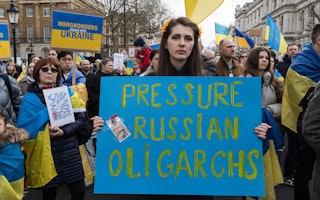Journalists Reveal the Secret World of Offshore Tax Havens
By Gerard Ryle & Marina Walker-Guevarra
On April 4, 2013, the International Consortium of Investigative Journalists (ICIJ) launched the second part of a multi-year project aimed at stripping away the biggest mystery associated with tax havens: the owners of anonymous companies.
Drawing from a trove of 2.5 million leaked files, ICIJ led what may be the largest cross-border journalism collaboration in history.
Our investigation opened the secrets of more than 120,000 offshore companies and trusts, and nearly 130,000 individuals and agents, exposing hidden dealings of politicians, con artists, and the mega-rich in more than 170 countries.
Within hours, Secrecy For Sale: Inside The Global Offshore Money Maze became a media phenomenon, known as “Offshore Leaks.”
It lifts the curtain on the offshore system and provides a look into the secret world of tax havens and the individuals and companies that benefit from them.
The files identified the individuals behind covert companies and private trusts based in the British Virgin Islands, the Cook Islands, Singapore, and other offshore havens. They include American doctors and dentists, and middle-class Greek villagers as well as Russia corporate executives, Eastern European and Indonesian billionaires, Wall Street fraudsters, international arms dealers, and families and associates of long-time dictators.
Among the key findings:
- Government officials and their families and associates in Azerbaijan, Russia, Canada, Pakistan, the Philippines, Thailand, Mongolia, and other countries have embraced the use of covert companies and bank accounts.
- The mega-rich use complex offshore structures to own mansions, yachts, art masterpieces, and other assets, gaining tax advantages and anonymity not available to average people.
- Many of the world’s top banks—including UBS, Clariden, and Deutsche Bank—have aggressively worked to provide their customers with secrecy-cloaked companies in the British Virgin Islands and other offshore hideaways.
- A well-paid industry of accountants, middlemen, and other operatives has helped offshore patrons shroud their identities and business interests, providing shelter in many cases to money laundering or other misconduct.
- Ponzi schemers and other large-scale fraudsters routinely use offshore havens to pull off their shell games and move their ill-gotten gains.
While reporting by ICIJ and its media partners showed that many users are engaged in legitimate transactions, it also raised questions about the lack of transparency, lax law enforcement, and illegal practices that are prevalent in the offshore world.
The collection of information, totaling more than 260 gigabytes of data, includes corporate files, emails, account ledgers, and other records that show cash transfers, incorporation dates and links between individuals and companies. It is believed to be one of the largest collections of leaked data gathered and analyzed by journalists.
The files illustrate how offshore financial secrecy has spread aggressively around the globe, allowing the wealthy to avoid taxes, fueling corruption and economic woes in rich and poor nations.
To analyze the documents, we collaborated with journalists from the Guardian and BBC in the UK, Le Monde in France, Süddeutsche Zeitung and Norddeutscher Rundfunk in Germany, the Washington Post, the Canadian Broadcasting Corporation (CBC), and 31 other media partners around the world.
The reporters and editors on the project team thoroughly fact-checked the data and cross-referenced it with other information, including court records, government reports, and financial databases. Team members interviewed hundreds of experts, government officials, attorneys, offshore clients, and other sources around the world.
The publication of the stories has sparked investigations, resignations, and a renewed sense of urgency among world leaders that it was time to act against tax havens.
Many officials welcomed the information and, in some cases, took concrete steps to start addressing the issue of offshore secrecy.
Just days after the ICIJ articles ran, the European Commissioner for Taxation, Algirdas Šemeta, said “recent developments, fuelled by the outcome of the Offshore Leaks, confirms the urgency for more and better action against tax evasion… Now it is time to put words into action.”
Shortly after Šemeta’s words, Luxembourg officials announced that they would end bank secrecy in their country for European citizens who have money saved in Luxembourg banks. Even more surprising was the news that Britain’s overseas territories have now agreed to start sharing information about beneficial owners of offshore accounts with the UK, France, Germany, Italy, and Spain.
The most interesting development since publication came when the United States, UK, and Australia governments announced that they are pursuing tax-evasion cases based on data that appear to be largely the same as ICIJ’s.
The officials said they are willing to share the information with their counterparts from around the world, in a way following the methodology pioneered by ICIJ in which local knowledge and cross-border collaboration were key to work the data.
British Prime Minister David Cameron then made a strong call during a press conference at the White House in Washington to tackle what he called “the scourge of tax evasion,” one of the key topics in next month’s G8 meeting in Ireland. Cameron said: “We need to know who really owns a company, who profits from it, whether taxes are paid.”
Since publication we’ve received thousands of emails, phone calls, and letters from reporters, prosecutors, NGOs, academics, government officials, and private citizens requesting that we search the data for them or let them access the data themselves.
At last count we’re working with more than 90 reporters in some 47 countries. And we’re getting ready for more collaborative reporting in countries we haven’t yet touched.
The International Consortium of Investigative Journalists is a grantee of the Open Society Foundations.
Gerard Ryle is director of the International Consortium of Investigative Journalists.
Marina Walker-Guevarra is deputy director of the International Consortium of Investigative Journalists.


